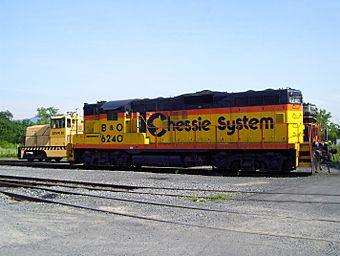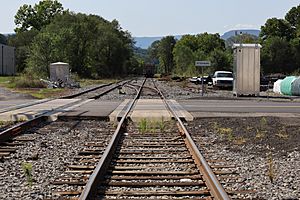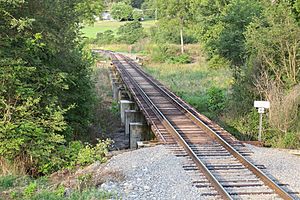South Branch Valley Railroad facts for kids

SBVR #6240, an EMD GP9
|
|
| Overview | |
|---|---|
| Headquarters | Moorefield, West Virginia |
| Reporting mark | SBVR |
| Locale | West Virginia |
| Dates of operation | 1978– |
| Predecessor | Baltimore and Ohio Railroad |
| Technical | |
| Track gauge | 4 ft 8 1⁄2 in (1,435 mm) standard gauge |
| Length | 52.4 miles (84.3 km) |
The South Branch Valley Railroad (SBVR) is a train line in West Virginia that is about 52 miles (84 kilometers) long. It runs through the eastern part of the state, following the South Branch Potomac River. The railroad goes from Petersburg north to Green Spring. There, it connects to the bigger national train network, which is run by CSX.
The SBVR is special because it's owned and operated by the West Virginia State Rail Authority. West Virginia bought the railroad from the Baltimore and Ohio Railroad on October 11, 1978. This made West Virginia the very first state to both own and run a commercial freight railroad! The main office for the State Rail Authority is in Moorefield, right along the SBVR line.
In 1985, a big flood caused a lot of damage to the SBVR. Most of the tracks and all three bridges over the South Branch Potomac River were destroyed. Even though some people thought the railroad might close down, rebuilding started two years later. Today, the SBVR is also home to the Potomac Eagle Scenic Railroad, a popular train ride for tourists.
The Story of the South Branch Valley Railroad
Early Ideas for a Railroad
Back in the 1800s, people in West Virginia wanted a train line to connect the South Branch Potomac River Valley. The main Baltimore and Ohio Railroad line was already built nearby in the 1840s. But there was no easy way to get goods and people in and out of the South Branch Valley.
In 1875, a group of business people tried to create the West Virginia Railroad Company. Their big idea was to build a railroad all the way across the state. It would connect the western part of West Virginia to the eastern part, including the South Branch Valley. This would help people get to the East Coast more easily. However, this company didn't manage to build the railroad.
Soon after, another group formed the Cumberland, Moorefield and Petersburg Railroad Company. They had a more focused plan: to build a line just from Petersburg to Green Spring. This would connect the South Branch Valley directly to the B&O mainline. But like the first company, they also couldn't get the project started.
Building the First Sections
The dream of a railroad finally started to come true on September 1, 1884. The South Branch Railroad Company, made up of local business owners, finished building the line from Romney to Green Spring. They especially wanted to connect Romney because it was an important town along a major road called the Northwestern Turnpike.
This company planned to extend the railroad south to Petersburg, passing through Moorefield. But this part of the line wasn't built right away. It took more effort from local people in the early 1900s.
Extending the Line to Petersburg
In 1909, the Hampshire Southern Railroad Company began building the line further south. They started from Romney and built a wooden bridge over the South Branch River. They continued along the river's western bank, even through a scenic area called The Trough.
By 1910, trains were running between Romney and Moorefield, carrying both goods and passengers. The line was now complete from Moorefield all the way to Green Spring. After finishing this section, the Hampshire Southern Company sold the line to the Moorefield and Virginia Railroad Company in 1911.
The Moorefield and Virginia Railroad Company then finished the last part of the line. They completed the link to Petersburg. This meant the entire railroad through the South Branch Valley was finally finished! After a short time, the Moorefield and Virginia Company sold the line to the Baltimore and Ohio Railroad Company.
The Baltimore and Ohio Railroad Era
The Baltimore and Ohio Railroad Company (B&O) took over the branch line in 1913. It became known as the South Branch line. At first, many people used the passenger train service. Students from nearby towns rode the train to high school in Romney. People from Petersburg and Moorefield found it a fast way to travel to larger cities like Cumberland and Martinsburg.
However, in the 1930s, the B&O stopped offering passenger service. They decided to focus only on carrying freight (goods). Eventually, in 1978, the B&O decided to abandon the entire line. Because people were worried about how this would affect the local businesses and economy, the state of West Virginia stepped in and bought the railroad.
The South Branch Valley Railroad Today
The West Virginia State Rail Authority (SRA) bought the line from the B&O on October 11, 1978. This made West Virginia the first state in the United States to own and operate a commercial freight railroad.
The railroad faced a huge challenge in 1985 when a major flood hit the South Branch Valley. The flood destroyed most of the tracks and all three bridges that crossed the South Branch Potomac River. There was talk of closing the railroad for good. But, rebuilding efforts began in 1987. By 1989, the reconstruction was complete, and train service returned to the communities along the line.
The rebirth of the railroad also brought the Potomac Eagle Scenic Railroad in 1991. This special train takes tourists on a beautiful trip from Romney to Moorefield. Passengers get to see historic places and enjoy the scenery, especially through The Trough. The train is named "Eagle" because passengers can often spot bald eagles nesting in the Trough area.
Communities Served by the SBVR
These are the towns and communities along the South Branch Valley Railroad, listed from south to north.
Grant County, West Virginia

Hardy County, West Virginia

- Durgon
- Taylor
- Moorefield
- Cunningham
- Mapleton
- McNeill
Hampshire County, West Virginia
 | Calvin Brent |
 | Walter T. Bailey |
 | Martha Cassell Thompson |
 | Alberta Jeannette Cassell |

